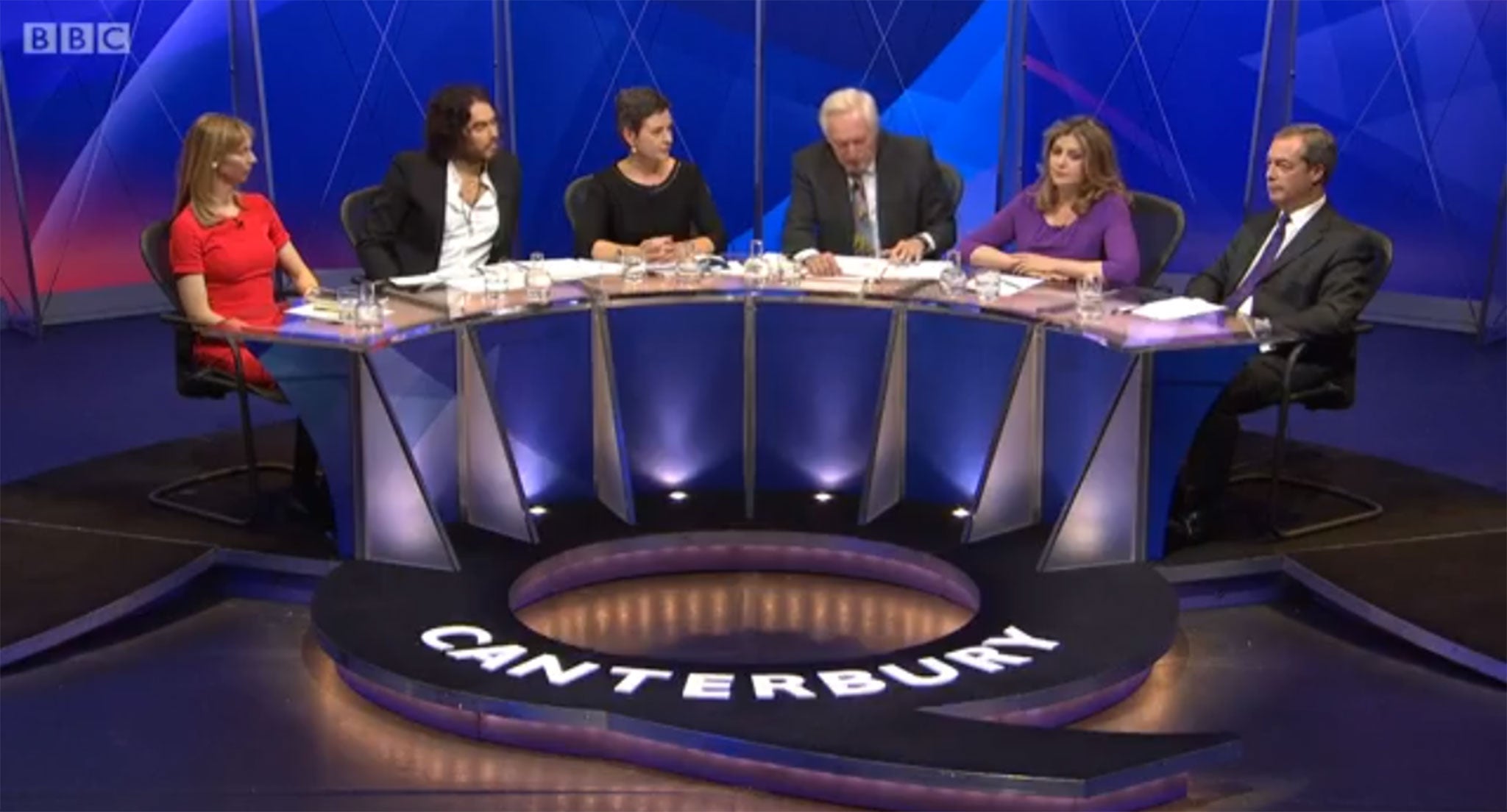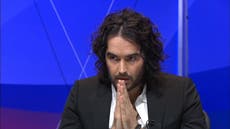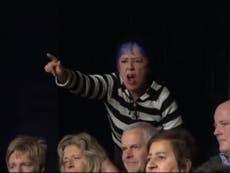Tired old Question Time is all mouth and too many trousers - it's time for a change
Nobody ever makes a point, because points do not get applause

It was billed as a battle of the mavericks. It turned out to be more of a squabble between bores. Russell Brand and Nigel Farage, the two clownish outsiders who have lurched on to the political landscape in this pre-election year, were on Question Time on Thursday night. Because, as any people’s hero knows, there is no better way to prove one’s anti-establishment credentials than with an expenses-paid appearance on the BBC’s flagship political show. A celebrity with messianic tendencies and hair! A bumptious leader who likes a pint! Some other politicians! The right number of women! Dimbleby!
In the event, it was the same old Question Time. David Dimbleby made his weekly joke about Twitter being faster than the post and looked bemused by the word “hashtag”. Everyone started out with their best measured voices on, and within four and a half minutes, ill-considered personal insults were zinging; the audience was lowing like festive cattle, and someone had asked a question that had no discernible beginning, middle, end nor point to it.
So here’s a question: what is the point of Question Time? It is supposed to be a forum for the public to engage in debate with politicians, but debate suggests intelligent, reasoned discussion. QT has only two modes: emollient and patronising, or shouty and sensationalist. Both are a turn-off.
The latter, of course, is the one that gets people talking, gets the hashtag buzzing, as Dimbleby might say. Take Thursday’s watercooler moments – an angry woman in the audience with blue hair who repeatedly shouted “racist” and told Farage that she was “coming for him” in South Thanet, and an equally impassioned man who demanded that Brand should stand for parliament.
Viewers are led to believe by the tenor of these exchanges that something significant is being said, that truth is being told to power. What was being said boiled down to pub insults and the confused notion that it is not right to express an opinion on politics unless you are willing to run as an MP.
The emollient, patronising mode is even more damaging. Barring some shouting and Brand’s pithy take-down of Farage as a “Poundshop Enoch Powell”, this edition was empty of memorable content. In the first 10 minutes, not a single policy point was made, let alone scored. Instead came platitudes wrapped in waffle inside a soundbite. “What makes people vote is hope,” wibbled Penny Mordaunt. “What people want is serious debate around the issues they care about.” “We’re not doing real politics any more,” blethered Farage. “Give us something to vote for,” Brand demanded. Hang on, Mary Creagh has something to say. “One of the things people don’t like is men talking over women.” Oh.
This was largely the fault of the first question: “Is the petty, adversarial nature of politics causing its own decline?” There followed unanimous condemnation of Punch-and-Judy politics as entertainment by all those who were sitting in a TV studio, filming a show that casts its panel and audience as adversaries and pitches politics as entertainment. Chris Morris and his Brass Eye team couldn’t have come up with a more beautifully, idiotically meta start to a show.
On and tediously on it went, so much drivel punctuated by the odd buzzword. Nobody ever makes a point, because on Question Time, points do not get applause, cadence does. A careful dissection of housing shortage statistics might get a polite ripple. The whooping and clapping is saved, always, for the person who manages to hit a crescendo at the right part of their sentence.
QT began in 1979 and is now well on the way to its 1,300th episode. Perhaps it is no surprise it looks a little tired. It has suffered during the Coalition: with both partners keen to keep out of the spotlight, appearances from senior ministers have become a rarity. Slippery to-and-fro has taken over.
The way people watch has changed, too. Both Farage and Brand, keen to continue the war that never was, blogged about the show on Friday, trading blows over immigration, poverty and chest hair. They understand that half of the battle is fought online – from the people who post soundbites to the live “hate-watching”.
There are myriad ways the public can engage with politicians now – sitting in a studio reading out pre-vetted questions is an old-fashioned faff compared with sending a tweet. With lightweight guests and an audience that watches with half an eye on the phone or tablet, attention-grabbing drama has become the norm. But it’s a fine line between making people shout at their television and driving them to switch off for good.




Join our commenting forum
Join thought-provoking conversations, follow other Independent readers and see their replies